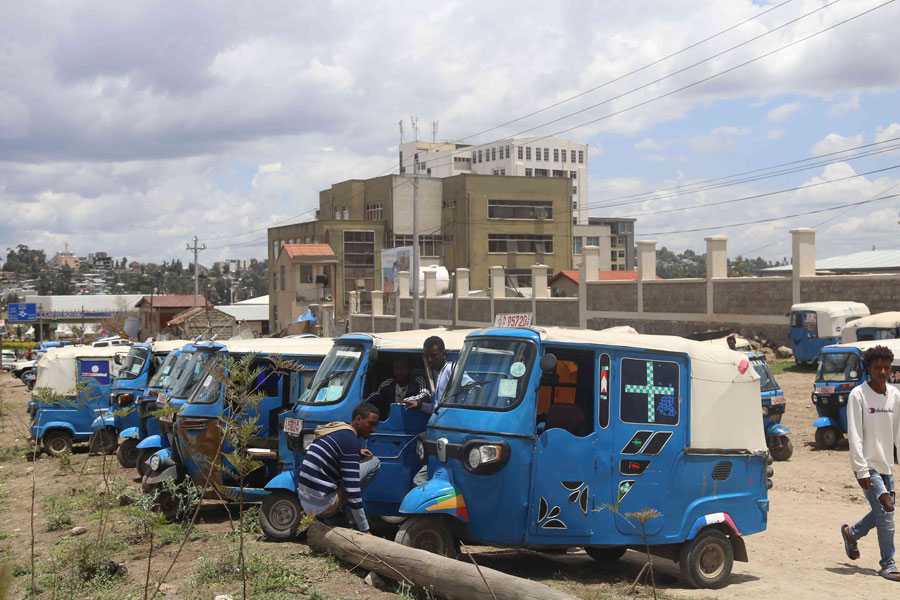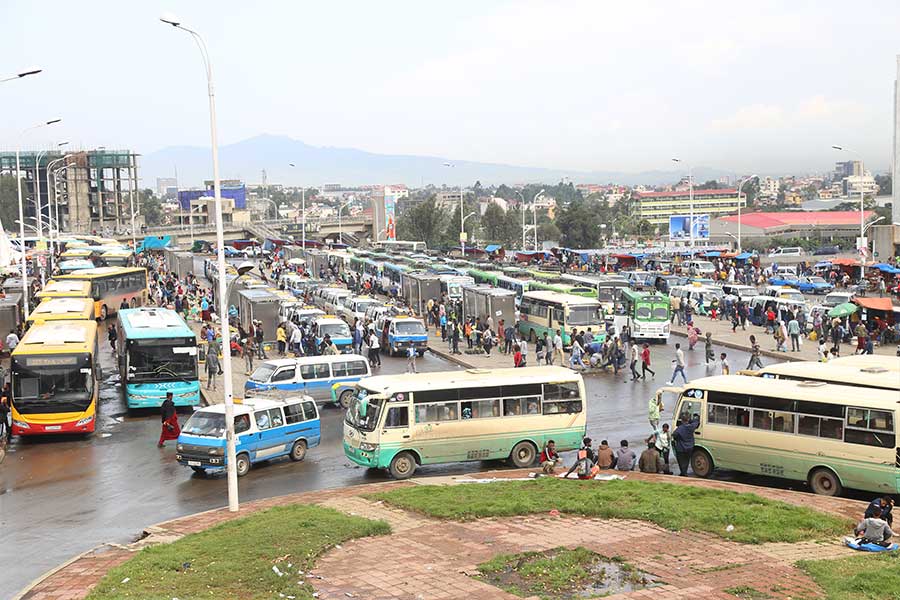
Fortune News | Jul 23,2022
Dec 29 , 2018.
Faced with a continued breakdown in the rule of law, it is easy to miss the stagnant state of economic fundamentals and service administration across the country. With seemingly endless existential threats facing the country, the bureaucracy and local authorities tasked with improving services and creating an enabling environment are getting a pass despite lack of flexibility and myopia.
For Addis Abeba, the threats are the rising cost of rent, homelessness and water shortages. There are also the city’s high unemployment rate that hovers around 20pc; a projected annual population boom of almost four percent; and one of the highest rates of income disparity in Ethiopia, where the 2011 Gini index puts the city at 0.61, nearly double the national ratio.
Despite investments made by the city administration, the persisting problem of public transportation is worrying. In the capital, 15pc of residents use private vehicles, just over half walk and a third are dependent on public transportation. The public transportation system, however, is characterised by its inefficiencies and inadequacies. Unfortunately, the prospects are that the situation will only get worse in the years to come given the compounding challenges the city confronts.
Addis Abeba’s population, estimated at 3.8 million currently, is expected to grow to at least five million within 12 years. The discouragingly high tariffs imposed on car imports will only ensure that the burden will likely fall on public transportation to carry the slack. As the city sprawl continues outwards from downtown, dependency on public transportation and private vehicles will only increase.
The consequences of a reduced modality of goods and people on the economy are self-evident. Its most negative influence will be on productivity, indispensable to any city with a service-based economy. A reliable and smooth transportation system is one of the foundations of a strong and competitive private sector. It is also the necessary means by which Addis Abeba can address the challenges it faces as a result of its population explosion.
Lack of a smooth and effective public transport system also serves as the push-factor for residents to acquire vehicles, adding to the already congested city traffic and at the expense of environmental pollution.
The City Administration does have policies in place to address the transportation problems. It includes increasing the number of paved roads in the city, installing traffic lights, robustly enforcing traffic rules and encouraging the use of buses for public transportation. The city is even awarding youth associations land to administer as parking lots with the aim of easing congestion, one of the chief hazards of a smooth public transport system.
In effect, it is expanding a program that is already in place but with the strategy of utilising it on a larger scale and stricter implementation. It is similar to the shortcomings of the policy making and regulatory schemes employed by the federal government, in that it falls short in flexibility.
Like much of the public sector, the city Transport Authority is working with little data, refuses to see the underlying structural problem and barely makes use of new technology. Most importantly, it treats private sector initiatives as threats to its regulatory capacity and as dangers to the common good.
What the public transport system requires is a more liberal approach. This does not mean a free-for-all system where government surrenders the provision of crucial services. Transportation, like education and health care, needs to be provided by the government to cater to a segment of the population that cannot be served by private players. But the private sector needs to be given enough room to play its part, while government works to fill the gaps.
The Transport Authority can begin by allowing minibus taxis complete freedom to choose their own routes and their operations. The obvious counter-argument to this is that certain difficult routes will be neglected and underserved, as market forces channel crucial services away from certain segments of the population.
The authorities can counteract this situation by implementing smart regulations. This will entail the introduction of variables such as levels of congestion, road conditions, availability of passengers in return trips and time of the day in the setting of tariffs.
Such dynamic pricing for transport tariffs will be able to provide private players the incentive not to abandon difficult routes and for new entrants to join. The government can fill in the gaps, where the inevitable high tariffs will be too expensive for certain segments of the public.
Another dynamic and innovative approach worth looking into is Pool Technology by Uber Technologies, a ridesharing company based in the United States.
Currently being employed in Cairo, Egypt, it allows minibus drivers to connect with multiple passengers. Its implementation in Ethiopia can go a long way in more efficiently connecting the public with the transportation provider.
Capability will remain the major roadblock that keeps the authorities from liberalising transportation and utilising new technology.
It would require the Transport Authority to graduate in its role from merely policing to smartly managing. Updating the blanket distance-based tariff system to dynamic pricing and encouraging taxi hailing firms to broaden their services for wider use requires a great deal of data, processing power and the use of algorithms to map out road and congestion conditions and the availability of commuters.
In effect, it would require the Transport Authority to step up its game.
PUBLISHED ON
Dec 29,2018 [ VOL
19 , NO
974]

Fortune News | Jul 23,2022

Radar | Apr 10,2021

Radar | Oct 12,2019

Agenda | Apr 09,2023

Fortune News | Oct 24,2020

My Opinion | Jan 07,2024

Radar | Sep 27,2025

Radar | Jan 12,2019

Fortune News | Jun 14,2020

Editorial | Jun 01,2019

Photo Gallery | 178090 Views | May 06,2019

Photo Gallery | 168299 Views | Apr 26,2019

Photo Gallery | 159061 Views | Oct 06,2021

My Opinion | 137044 Views | Aug 14,2021

Dec 22 , 2024 . By TIZITA SHEWAFERAW
Charged with transforming colossal state-owned enterprises into modern and competitiv...

Aug 18 , 2024 . By AKSAH ITALO
Although predictable Yonas Zerihun's job in the ride-hailing service is not immune to...

Jul 28 , 2024 . By TIZITA SHEWAFERAW
Unhabitual, perhaps too many, Samuel Gebreyohannes, 38, used to occasionally enjoy a couple of beers at breakfast. However, he recently swit...

Jul 13 , 2024 . By AKSAH ITALO
Investors who rely on tractors, trucks, and field vehicles for commuting, transporting commodities, and f...

Oct 25 , 2025 . By YITBAREK GETACHEW
Officials of the Addis Abeba's Education Bureau have embarked on an ambitious experim...

Oct 26 , 2025 . By YITBAREK GETACHEW
The federal government is making a landmark shift in its investment incentive regime...

Oct 27 , 2025
The National Bank of Ethiopia (NBE) is preparing to issue a directive that will funda...

Oct 26 , 2025 . By SURAFEL MULUGETA
A community of booksellers shadowing the Ethiopian National Theatre has been jolted b...